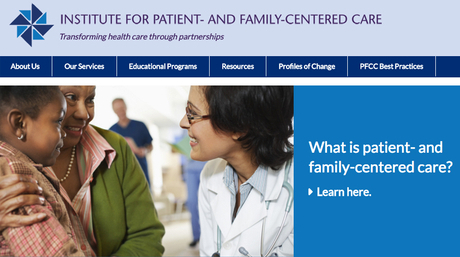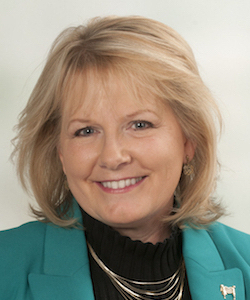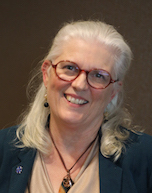Announcing IPFCC’s Redesigned Website
|
 |
IPFCC is proud to announce that we are launching our redesigned website. Easy to navigate, the website will get you more quickly to the information and resources you need to advance the practice of patient- and family-centered care! A new section, Our Services, features IPFCC’s onsite consulting and training/technical assistance. Find information about how you can bring IPFCC staff and faculty to your organization for individualized services such as an organizational assessment, guidance and coaching, and education for leaders, clinicians, staff, and patient and family advisors.
We also added inspirational and informative stories—IPFCC partnered with StoryCorps for our 7th International Conference held in New York in July 2016. We share two stories—one by Juliette Schlucter, Director of The Center for Child and Family Experience at the Sala Institute for Child and Family-Centered Care at Hassenfeld Children’s Hospital of New York at NYU Langone and her daughter Julia Rae and one by Jim Conway, a national leader and currently a trustee for the Lahey Health System and Winchester Hospital, who discusses his perspective about the importance of building authentic partnerships with patients and families. Jim is interviewed by Maureen Connor, a health care consultant with vast experience working in quality and risk management. We invite you to listen to their stories and share them with others. Watch for more StoryCorps recordings in the coming months.
We will continue to add to the website, expand the resources, share new information about PFCC innovations, and profile success stories. If you have ideas for new content, please contact us. We also invite your feedback about the website’s redesign. If you have visited our website very recently, please refresh the page to access our new website.
|
News Flash – CMS releases its Person and Family Engagement Strategy
|
Kate Goodrich, MD, MHS, Director, Center for Clinical Standards and Quality, CMS released the CMS Person and Family Engagement Strategy at its Quality Conference in Baltimore, MD on December 13th. This new Strategy evolved from and is central to the CMS Quality Strategy.
“This Strategy emphasizes . . . proactive, effective communication and partnered decision-making with patients, families, and caregivers. It is about building a care relationship based on trust and inclusion of patients’ beliefs, values, preferences, and culture which can even lead to a reduction in health care disparities . . . . It is essential to include family members, care-givers, and close friends in the conversation about health when the patient desires inclusion of others.”
The intent of the Person and Family Engagement Strategy is to inform and guide all programs within the agency. Further, through this strategy, CMS will include patients receiving care and their advocates in policy and program design and decision-making.
|
San Antonio Intensive Seminar –
A Successful Event
|
IPFCC’s Intensive Seminar, Moving Forward with Patient- and Family-Centered Care, held in mid-November in San Antonio, TX, was a successful learning experience and IPFCC is grateful for the generous sponsorship of Mednax Health Solutions Partner and other organizations.
The 250 participants (representing over 83 organizations, from 25 U.S. states and the District of Columbia, and 3 Canadian provinces) were enthusiastically engaged in the many seminar sessions and applied what they learned to create organizational action plans. A few examples include:
- The Children’s Hospital of San Antonio (a program sponsor) plans to revise its Family Presence Guidelines and use several of the tools from IPFCC’s Better Together campaign for patient/family and staff education.
- Kingston General Hospital in Ontario, Canada proposes a reunion of the San Antonio seminar and past IPFCC seminar participants from their organization. The meeting is planned to “take stock” of the current state of patient- and family-centered care in order to continue their journey to advance PFCC within their newly integrated academic health sciences centre.
- Tampa General Hospital in Florida developed a plan with the goal of integrating patient- and family-centered care into the primary care practices affiliated with the hospital.
|
Primary Care Corner – UW Health’s Psychiatry PFAC
|
The University of Wisconsin Hospital and Clinics (UW Health) psychiatry and psychology services emphasize assessment, treatment, and management of mental health concerns for patients of all ages. Providers offer medical and therapeutic interventions in both outpatient and inpatient treatment settings for individuals and their families. The UW Health system includes several outpatient clinics offering behavioral health services.
Recently, the Patient and Family Advisor (PFA) Partnership Program extended into mental and behavioral health. The Psychiatry Patient and Family Advisory Council (PFAC) started in November 2014 and has been instrumental in improving the quality of patient care for the children, adolescents, and adults with mental health needs seen throughout UW Health. Currently, 12 PFAs serve on the Council. Although the PFAC is relatively new, it was “able to mobilize quickly, building on the strong foundation of UW Health’s PFA Partnership Program,” according to Lisa McGuffey, PhD, Co-Chair of the Psychiatry PFAC.
The PFAC has worked toward integrating behavioral health services into primary care practices in the following ways:
- Making clinics more welcoming to patients by including diversity in literature, artwork, and accessibility with a focus on comfort and privacy.
- Creating public relations messages to reduce stigma and inform patients about the availability of mental health services throughout UW Health.
- Developing a comprehensive Behavioral Health page for the UW Health website highlighting the institution’s value of “partnering to promote mental health and well being.”
Dr. McGuffey recognizes the challenges unique to behavioral and mental health and outreach to the community. “In so many ways, the patient and family advisors on our PFAC have helped us understand how to address people’s fears about mental health services. That input has been invaluable.”
IPFCC is partnering with the Patient-Centered Primary Care Collaborative (PCPCC) as part of its Transforming Clinical Practice Initiative (TCPI) Support and Alignment Network (SAN). This column provides highlights from the field.
If you already partner with patients and families to improve primary or ambulatory care and want to share your successes, or you want to learn more, IPFCC hosts a free online learning community for Primary and Ambulatory Care Partnerships on its PFAC Network. For more information about joining, please contact Mary Minniti at mminniti@ipfcc.org or sign up on IPFCC's PFAC Network.
|
Engaging Patients as Partners in Practice Improvement: A Survey of Community Health Centers
|
In its July 2016 issue, the Journal of Clinical Outcomes Management reported on a study of 97 community health centers in California, Arizona, Nevada, and Hawaii and how they engaged patients in practice improvement. According to the article, “leadership support and having a formal strategy to identify and engage patients as advisors were positively associated with patient impact on strategic goals.” Read the abstract.
Related to this study, a smaller qualitative study was conducted by Sharma and colleagues to explore patient advisory councils in primary care practices in California to identify best practices. One staff member and one patient advisor from eight clinics with established and active patient and family advisory councils were interviewed. Four core themes were developed from the findings and the detailed discussion will be helpful to patient and family advisory councils partnering in any setting. Access the full article, “How Can We Talk about Patient-centered Care without Patients at the Table?” Lessons Learned from Patient Advisory Councils from the latest issue of the Journal of the American Board of Family Medicine.
|
|
In this Issue
|
- Announcing IPFCC’s Redesigned Website
- News Flash – CMS releases its Person and Family Engagement Strategy
- San Antonio Intensive Seminar – A Successful Event
- Primary Care Corner – UW Health’s Psychiatry PFAC
- Engaging Patients as Partners in Practice Improvement: A Survey of Community Health Centers
- Open Notes: How the Power of Knowing Can Change Health Care
|
Upcoming Webinars
|
|
January 10, 2017
The Role of Leaders in Advancing Patient- and Family-Centered Practice
Speaker: Beverley H. Johnson
Whether you are a senior leader—or you are hoping to influence the leadership of your organization—join
this webinar to explore the essential role of leaders in developing meaningful and sustained partnerships with patients and families. Get more details and register.
January 26, 2017
Creating and Sustaining a Patient and Family Advisory Council
Speakers: Julie Moretz &
Kelly Parent

Julie Moretz, BS
|

Kelly Parent, BS
|
An increasing number of hospitals and health care organizations have recognized the value of creating patient and family advisory councils to improve clinical outcomes, reduce harm, and create satisfying health care experiences for all. Join this webinar to learn the steps and tactics needed to create your “first” advisory council and learn how seasoned councils keep the momentum going. Get more details and register.
|
Featured Webinar Recordings
|
Missed one of these IPFCC webinars? Register to view the recording!
Improving Patient and Family Engagement in Mental Health Settings

Mary Minniti, CPHQ
|

Patty Yoon, RPN, MA
|

Jason MacLeod,
Patient Advisor
|
This webinar highlights how to implement patient- and family-centered care in various mental health settings. Ways to engage individuals in the direct care experience and as quality improvement partners are showcased. Practical tools and tips that help build strong partnerships with those receiving mental health services and their families are shared. Get more details and register.
HIPAA and Patient- and Family-Centered Care

Lindsay Lang, MHSA,
RN
|
Many health care providers believe that HIPAA presents a barrier to the practice of PFCC. When interpreted correctly, however, the regulations actually provide new opportunities for collaboration rather than limiting them. Learn more about how HIPAA can facilitate health care professionals working in partnership with patients and families. Get more details and register.
|
IPFCC Webinars are a cost-effective educational resource. Cost is per line, so a group of any size can participate from the same location on one line. Learn more.
|
Open Notes: How the Power of Knowing Can Change Health Care
|
An article in the October 27, 2016 issue of NEJM Catalyst reported results from a study of the OpenNotes initiative that began in 2010. According to the authors, “OpenNotes is sending a powerful message about how organizational transparency and inclusivity can empower patients and doctors and potentially improve the delivery of care.”
Among the patients in the OpenNotes trial who reviewed their notes, roughly 75% reported better recall of care plans, better self-care, a clearer understanding of their conditions, and feeling more in control of their health care.
The article also mentioned an OpenNotes patient reporting tool developed by Beth Israel Deaconess Medical Center in partnership with its Patient and Family Advisory Council. The tool has helped patients and family members identify medication errors and inaccurate problem lists and close loopholes in diagnostic accuracy. Read the full article.
|
Links
|
|
• International Conference
• IPFCC Webinar Schedule
• IPFCC Calendar of Events
|
Previous Issues |
|
• October 2016
• September 2016
• August 2016
• More issues from the Archive
|
About Us
|
| Founded in 1992 as a nonprofit organization, the Institute for Patient- and Family-Centered Care (IPFCC) works to advance the understanding and practice of patient- and family-centered care in all settings where individuals and families receive health care. |
|